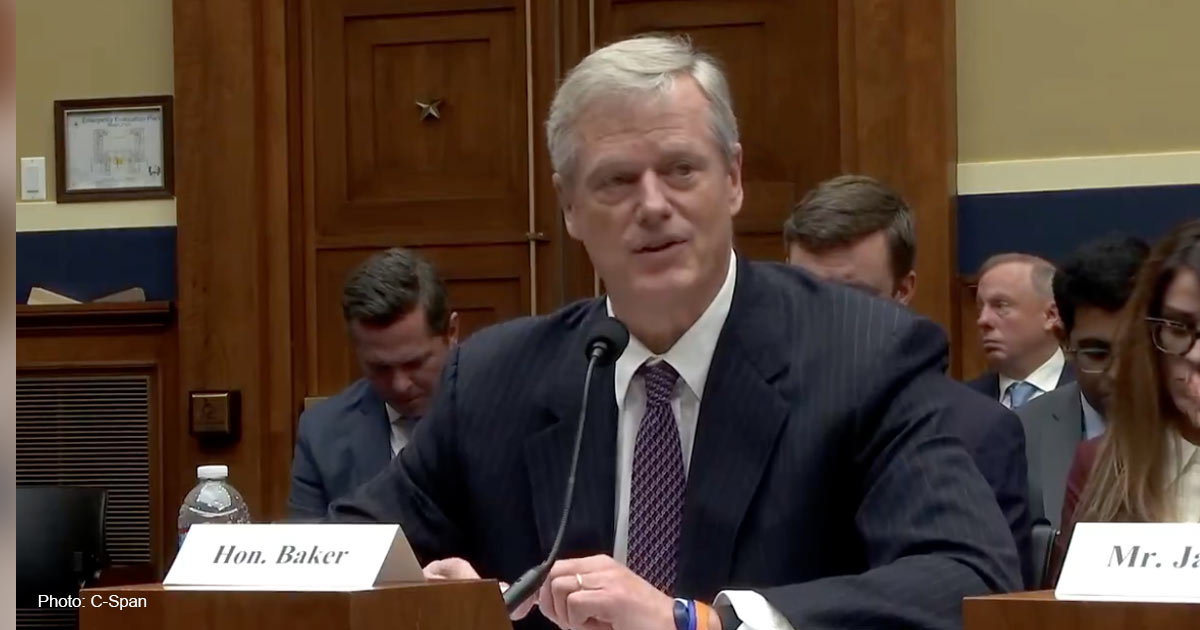- Dec 3, 2006
- 2,402
- 889
- 59
- Country
- United States
- Faith
- Baptist
- Marital Status
- Married
- Politics
- US-Republican

New NCAA Boss Shrugs Off Outrage over Girls’ Sports in House Hearing
For someone who's been on the job for 10 months, NCAA President Charlie Baker certainly doesn't seem to have a grasp of the important issues. While the biggest
In one of his many stops at the Capitol over his young tenure, Baker took another turn on the hotseat Thursday — this time in a House subcommittee. While there are plenty of heated debates in collegiate sports to keep the new boss busy, Rep. Debbie Lesko (R-Ariz.) did manage to slip in questions about an issue that most families think is more pressing: the transgender takeover of their daughters’ locker rooms, scholarships, and teams.
To the disappointment of millions of athletes, Baker — who many thought would be an improvement over weak-kneed Mark Emmert — hasn’t distinguished himself at all from his successor. If anything, he’s been even more indifferent to the war raging over boys in girls’ spaces — choosing silence over engagement.
Twelve-time All-American Riley Gaines had hoped (wrongly, it turns out) that Baker would make combatting the erasure of women a priority in his administration. Instead, her requests for meetings and letters representing hundreds of girls have gone unanswered, an apathy Lesko refuses to tolerate. Reading portions of Gaines’s letter into the record, Lesko said, “Without single-sex competition, there can be no equal athletic opportunity,” she paused. “The NCAA knows this, yet it continues to propagate a policy that allows male athletes on women’s teams. We renew our demands to the governing body to repeal all policies and rules that allow male athletes to take roster spots on women’s teams and compete in women’s events,” she quoted from Gaines.
“My question to you, sir,” Lesko turned to Baker, “will you commit to meeting with the women athletes as requested in this letter?”
“Sure,” Baker replied nonchalantly.
“My next question is,” the congresswoman continued, “will the NCAA make the changes requested in this letter?”
Bristling, Baker fired back, “Just for your own information, every single NCAA championship, the host community and the host institution and the host organization under our current rules, is required to provide safe and secure accommodations to all athletes. And if the athletes are looking for specific solutions to deal with concerns that they have, they’re going to get them.”
As usual, that didn’t answer Lesko’s question or provide any reassurance that the former governor took their complaints seriously. Instead, he said vaguely, “We should never be in a position where we’re putting someone in a position where they feel they’re not safe, period. I can’t speak to what happened before I got here, but those are the rules as they stand right now.”
Bringing the conversation back to Gaines, Lesko pointed out that the former University of Kentucky swimmer hasn’t gotten a response to her inquiries — most recently at the 2024 National Collegiate Athletic Association Convention in Phoenix, where Gaines and other activists protested the sports’ body’s inaction. There, the swimmer hand-delivered another letter, explaining, “We feel as if our voices are not being heard. That is the objective, that is why we are here — that is why we are chanting. We want to be let into the conversation. So at any opportunity, at any chance to meet, we are happy and more than willing to work with you all on looking at what this looks like, how to uphold fairness and protect our rights to privacy and our rights to safety and our sports.”
“Nothing’s really changed,” Lesko pointed out. “Well,” Baker replied, “my first year, my primary objective was to do something nobody had ever done before in my job, which was to meet with all 97 conferences,” he said. “To get a sense about what the key issues and opportunities associated with college sports were. And I spent dozens of hours with student-athletes. … If folks want to have an open conversation about issues associated with college sports and with sports generally, we’ll figure out how to make that happen,” he said.
“I hope it happens soon,” Lesko admonished.
So do hundreds of female athletes — young women like Macy Petty, who’ve had to face-off with stronger, more powerful male opponents in the NCAA. While Macy wasn’t injured in her volleyball match, others haven’t been so lucky.
